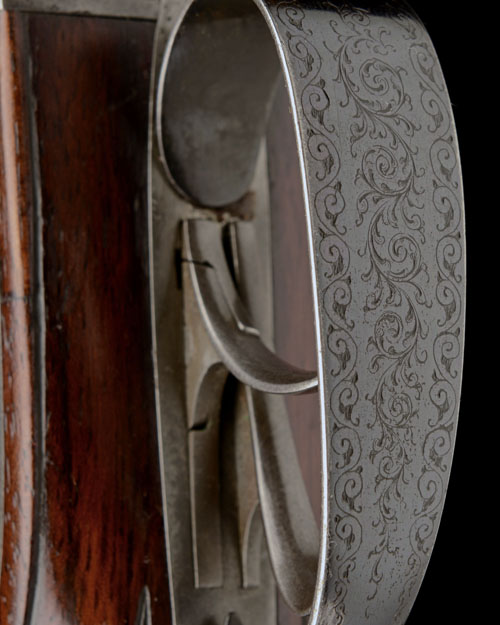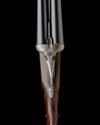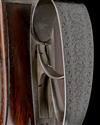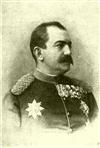Product Details
J. PURDEY & SONS
A 12-BORE SELF-OPENING SIDELOCK NON-EJECTOR, serial no. 12788,
27 3/4in. replacement nitro barrels by Canon Gallia, sunken rib, 2 1/2in. chambers, bored approx. 3/4 and full, self-opening treble-grip action with hidden third bite, sideclips, automatic safety with gold-inlaid 'SAFE' detail, arrow cocking-indicators, articulated front trigger, best fine bouquet and scroll engraving, brushed finish, 14in. replacement pistolgrip stock including buttplate, the grip unchequered and with decorative studs, the pistolgrip cap with similar decorative stud, weight 6lb. 4oz.
Provenance: The makers have kindly confirmed that this gun was completed in November 1887 for His Majesty the King of Serbia.
Milan Obrenovic (1854-1901), was the ruler of Serbia from 1868 to 1889, first as prince (1868-1882) and as king (1882-1889).
Milan Obrenovic was born in 1854 in Marasesti, Moldavia where his family lived in exile ever since the 1842 return of the rival House of Karadordevic to the Serbian throne when they managed to depose Milan's cousin Prince Mihailo Obrenovic III.
Shortly after Milan's birth, his parents divorced. Several years later on 20 November 1861, at the tender age of seven, Milan lost his father Miloš who died fighting the Turks near Bucharest as a foreign mercenary in the Romanian Army, meaning that mother Marija got a legal custody. Marija, however, lived a lavish aristocratic lifestyle, soon becoming Romanian ruler Alexandru Ioan Cuza's mistress and bearing him two sons - Sasa and Dimitrie. As a result she showed little interest in her children from the previous marriage with Miloš so an agreement was reached for young Milan to get legally adopted by his cousin Mihailo Obrenovic III who in the meantime, following the 1858 expulsion of the Karadordevics, returned to Serbia where he became the ruling prince in 1860.
On 10 June 1868, when Milan was only fourteen years of age, Prince Mihailo Obrenovic III was assassinated. As the late prince did not have any male heirs, the question of who was to succeed him on the Serbian throne became a pressing one. In the post-assassination chaos and the resulting power vacuum, influential senior statesman Ilija Garašanin re-emerged in Serbian political life, despite only eight months earlier being removed by the late Prince from the ministry president post and replaced with Jovan Ristic. While consolidating forces within the state to prevent the conspirators from taking over the power, Garašanin also reportedly contemplated solving the throne issue by starting a third royal dynasty. General political consensus was that the new ruler should be selected by the Grand National Council. However, cabinet minister Milivoje Petrovic Blaznavac was rapidly increasing his power and influence. He had managed to consolidate his control over the army and stage a coup d'état. So when Blaznavac suggested the young Milan as the successor to Prince Mihailo, Garašanin had no choice but to yield to the more powerful authority.
In 1871, the Prince faced two separate incidents although it is unclear as to whether these were genuine attempts on his life. In May as he exited the National Theatre building, a bomb exploded a couple of hundred metres away on Terazije. Buried under a footpath, the exploded device didn't cause anyone injuries. At the time and there was speculation in Serbia that it was Blaznavac who had organised the explosion in order to scare and confuse the young Prince who was nearing his age of majority into remaining reliant on Blaznavac. The event became known as the Terazijska bomba (Terazije Bomb) in the Serbian historiography.
Several months later, on 6 October, Prince Milan was involved in another incident, this time during a visit to Smederevo. At some point, he went to an outhouse to relieve himself and while above the pit toilet, the wooden floor caved in under his weight and he fell into the pit. As he was armed at the time, the Prince began shooting his pistol in order get the attention of his entourage who rescued him.
On 6 March 1882, Principality of Serbia was declared a kingdom and Milan got proclaimed King of Serbia.
Acting under Austrian influence, King Milan devoted all his energies to the improvement of the means of communication and the development of natural resources. However, the cost of this, unduly increased by reckless extravagance, led to disproportionately heavy taxation. This, coupled with increased military service, rendered King Milan and the Austrian party unpopular.
Milan's political troubles were further increased by the defeat of the Serbians in the war against Bulgaria from 1885-1886. In September 1885, the union of Eastern Rumelia and Bulgaria caused widespread agitation in Serbia. Milan promptly declared war upon the new Bulgarian state on 15 November. After a short, decisive campaign, the Serbs were utterly routed at the Battle of Slivnitsa and at the Battle of Pirot. Milan's throne was only saved by the direct intervention of Austria-Hungary. Domestic difficulties now arose which rapidly assumed political significance.
In his personal life, Milan was anything but a faithful husband, having an affair with most notably Jennie Jerome (wife of Lord Randolph Churchill and mother to Winston Churchill) among others, while Queen Natalija was greatly influenced by Russian sympathies. In 1886, the couple, mismatched both personally and politically, separated after eleven years of marriage.
Natalija withdrew from the kingdom, taking with her the ten-year old Prince Alexander (later King Alexander I). While she was residing at Wiesbaden in 1888, King Milan succeeded in recovering the Crown Prince, whom he undertook to educate. In reply to the Queen's remonstrances, Milan exerted considerable pressure upon the metropolitan, and procured a divorce, which was afterwards annulled as illegal. King Milan now seemed master of the situation.
On 3 January 1889, Milan adopted a new constitution much more liberal than the existing one of 1869. Two months later, on 6 March, thirty-four-year-old Milan suddenly abdicated the throne, handing it over to his twelve-year-old son. No satisfactory reason was assigned for this step. Milan settled in Paris as a private individual.
Please click HERE to view Terms & Conditions.
Estimate £3,500-4,500
S2







